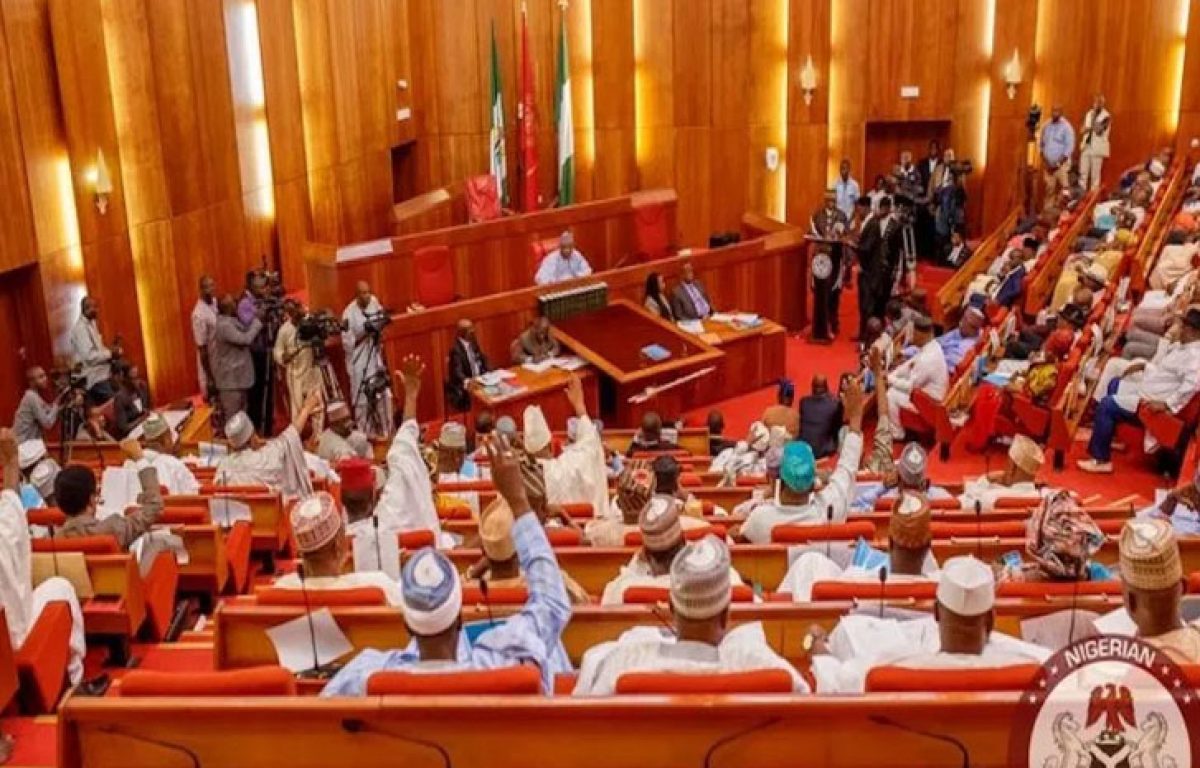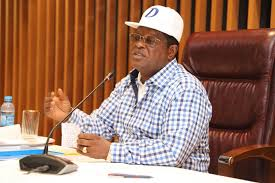Business
Adeosun takes economic reform agenda to World Bank Spring Meetings
Calls for greater African and international collaboration on illicit financial flows to drive accelerated revenue growth and improved government efficiency.
The Minister of Finance, Kemi Adeosun, is in Washington DC this week, attending the World Bank and IMF Spring Meetings.
A statement by Festus Akanbi said the Minister is participating in a range of events focused on different aspects of the Federal Government’s economic reform agenda. At her opening event on Monday, she gave an address to the Global Parliamentary Conference, alongside parliamentarians from around the world, focused on Nigeria’s economic reform agenda and the need for strong executive and legislative collaboration.
Addressing senior representatives from the World Bank and IMF, as well as over 150 parliamentarians the Minister called for greater focus on collaboration in illicit financial flows from Africa as a core pillar of the government’s strategy to significantly enhance domestic government revenue and deliver sustainable economic growth.
“The government is focused on resetting the Nigerian economy by addressing our traditional over-reliance on oil revenues and establishing the basis for sustainable non-oil revenue growth. To improve non-oil revenues, we have to address illicit capital flows. When stolen money is transferred from Nigeria, or other African countries, there are too few questions asked by those countries that receive the funds, but when we identify those funds as stolen and seek to recover them, there are too many questions being asked. There is money sitting in foreign bank accounts that we have spent over a decade trying to recover. That is money that could deliver significant value for Nigeria as we seek to increase spending on critical infrastructure and establish a basis for long term sustainable growth. I hope that the Automatic Exchange of Information scheme coming into force next year will be a step towards achieving greater transparency, but we need more collaboration amongst parliamentarians in Africa, and across the World to ensure that this situation improves and that recipient countries are held to account.”
Commenting on the domestic agenda to ensure significant reductions in ‘leakages’ of public funds, and improved efficiency in public expenditure, the Minister said:
“We are going after those who have stolen our money. We have put in place a very successful whistle blower programme that is delivering results, and allows those who report illicit activity to receive up to 5% of any funds that we recover. We are also significantly improving our financial management controls to ensure that it is considerably more difficult for public funds to be diverted. We have to do more though and that means collaboration with the legislature. We need tighter tax and financial reporting legislation and to ratify bilateral agreements so that our enforcement agencies are empowered to deliver the results that we need.”
The Minister will be attending a series of meetings over the coming days, including meetings with the World Bank to take forwards conversations about lending into strategic sectors of the economy as part of the administration’s focus on addressing Nigeria’s infrastructure deficit and accelerating implementation of critical projects.
“To create the basis for long term growth, we need to invest urgently in our infrastructure. Achieving energy sufficiency and achieving agriculture and food security are two of the execution priorities we have identified in the Economic Recovery and Growth Plan and we are looking forward to advancing our ongoing conversations with multilateral lenders on these priorities over the coming days as we look to accelerate implementation.”
The Minister will also speak at fora on how to improve Nutrition and how to close the Financing Gap for Water Resources.
Business
Senate Committee Commends Tinubu on Launch of National Halal Economy Strategy to Tap $7.7trn Global Market*

The Senate Committee on Finance has commended President Bola Ahmed Tinubu for launching Nigeria’s National Halal Economy Strategy, describing it as a bold and strategic move to position the country within the lucrative global halal market, estimated at $7.7 trillion.
In a statement signed by its Chairman, the committee praised the initiative as timely and aligned with international best practices. Several countries—including the United Kingdom, Canada, Australia, Malaysia, Indonesia, Saudi Arabia, the United Arab Emirates, Turkey, Brazil, Thailand, and Singapore—have successfully used halal frameworks to boost manufacturing, agricultural exports, financial markets, and foreign investment.
The committee highlighted Nigeria’s strong advantages for success in this space, including its vast agricultural resources, large domestic market, youthful population, growing manufacturing sector, and expanding services industry.
It noted that the strategy fits seamlessly into the Tinubu administration’s broader economic reforms, such as boosting non-oil revenue, diversifying exports, creating jobs, supporting small and medium enterprises (SMEs), and increasing foreign exchange earnings.
President Tinubu, represented by Vice President Kashim Shettima, officially unveiled the strategy on Thursday, February 6, 2026, at the Presidential Villa in Abuja.
The framework, developed in collaboration with Saudi Arabia’s Halal Products Development Company (HPDC) following a bilateral agreement signed in February 2025 at the Makkah Halal Forum, aims to enhance quality standards, certification processes, and competitiveness across sectors like food, pharmaceuticals, cosmetics, tourism, and ethical finance.
The committee described the strategy as inclusive, market-driven, and globally oriented, while fully respecting Nigeria’s diverse and pluralistic society.
It is projected to contribute significantly to the economy, with estimates suggesting it could add around $1.5 billion to Nigeria’s GDP by 2027 and unlock billions more in domestic value over the coming decade through expanded exports and investment.
The Senate Committee on Finance pledged its full legislative support, oversight, and cooperation to ensure smooth implementation, regulatory clarity, and long-term fiscal sustainability in the national interest.
“This decisive step reinforces Nigeria’s readiness to adopt proven international models, unlock new economic frontiers, and establish itself as a competitive player in the evolving global economy,” the statement concluded.
Business
Ex-Naval Chief Named in ₦100m Property Transaction Dispute
A property transaction dispute has emerged involving Zoe New Dawn Nigeria Limited and a former Chief of Naval Staff, following claims by the company’s chairman, Engr. Dr. Stephen Achema Akpa, that a ₦100 million payment made for land was not followed by a transfer of ownership.

According to Akpa, the payment was made in connection with a land transaction reportedly facilitated by the former naval chief. He alleged that despite documented payments, the land in question was neither transferred to the company nor was the money refunded.
Akpa said Zoe New Dawn Nigeria Limited possesses transaction records and related documents which, he claims, support its position in the dispute. He added that the company has initiated steps to seek redress through appropriate legal channels.
The matter has drawn attention due to the profile of the parties involved, particularly against the backdrop of recurring disputes linked to land ownership and property transactions in Nigeria’s real estate sector.
Industry observers note that unresolved land transactions remain a common source of litigation, often arising from disagreements over title documentation, intermediaries, and contractual obligations.
Zoe New Dawn Nigeria Limited stated that it intends to pursue the matter through lawful means to determine liability and recover any funds deemed outstanding.
As of press time, no official response had been issued by the former Chief of Naval Staff regarding the allegations. The dispute has not yet been confirmed as the subject of any court proceedings.
Business
Umahi Inspects Lekki Corridor’s 7th Axial Road Project, Expresses Confidence in CHEC

Minister of Works Senator Dave Umahi over the weekend inspected the progress of the 7th Axial Road project in the Lekki Corridor of Lagos.
The project, located behind the Dangote Refinery, is a crucial cargo handling route for the Lekki Deepwater Port and connects the Lekki Corridor with the Sagamu route.
The Minister expressed confidence in China Harbour Engineering Company Limited (CHEC), the project’s contractor, citing its successful delivery of the Lekki Deepwater Port and high-quality progress on the Makurdi-Enugu road reconstruction and expansion project. Umahi instructed that the roadbed filling work for Project LOT1 be completed by the end of April and directed the project team to accelerate resource input and tangible works to meet the deadline.
The 7th Axial Highway is expected to synergize with key infrastructure projects like the Coastal Road, Dangote Road, and Lekki Port, creating a comprehensive transportation hub model and boosting Nigeria’s port economy and industrial corridor. Umahi emphasized the need for environmental protection agencies to ensure efficient construction and steady progress while maintaining ecological safety.
A representative of CHEC who spoke during the inspection stated that the company would maintain a high level of resource input, implement the Minister’s directives, and coordinate safety, quality, and environmental protection to ensure the project’s timely and high-quality completion in other to unluck its port relief and regional economic benefits.
-

 Uncategorized5 years ago
Uncategorized5 years agoFG, states urged to harness flooding for ranching, others with technology – Agbaje
-

 Headlines10 years ago
Headlines10 years agoBreaking: EFCC seals Borno House of Assembly, as Hon members take to their heels
-

 News12 years ago
News12 years agoNigeria Security Operatives Stage Manhunt For Homosexual Perpetrator
-

 News9 years ago
News9 years agoHow 21-year-old Girl fled community over accusation of lesbianism
-

 News10 years ago
News10 years agoYobe Gov Moves Against Deputy
-

 Opinion7 years ago
Opinion7 years ago7 signs she has friend zoned you
-
Technology4 years ago
Online job placement company headhunts women
-

 Headlines10 years ago
Headlines10 years agoBorno Dep Gov Abducts Another Church Leader





